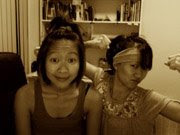“A gift economy is an economic system in which the prevalent mode of exchange is for goods and services to be given without explicit agreement upon a quid pro quo” (Wikipedia, 2007)
Almost anything can be considered as a gift, as long as there is giving. In the gift economy, there is limit to how much you can give; however, giving does not necessarily mean that you will receive something after the act. A blog, a book, simple website and even a conversation between two are all forms of gifts. They teach and give insights to certain areas and ideas, these are all considered gifts.
A Gift Economy can provide several benefits. One benefit would be that the “gift” that’s given can provide someone who has no means of attaining it with the need for this “gift”. More often than not, when u give this “gift”, one rarely expects for anything in return. “In a ‘market’ economy, says Hyde, the highest status belongs to those who have acquired the most. In a Gift Economy, the highest status belongs to those who have given the most. But what is most important, he says, is that the gift must always move.” (Pollard, 2005) It was believed that the move Pay It Forward had a part to play in this economy and a strongly agree. This movie touched the hearts of many when a small boy wanted to do something for the world. He began with a simple school project.

The diagram above was the example of what the boy’s idea was all about. He believed if one person were to give to another two, and another two people were to give to another two and so on, the gift would constantly move and multiply. I believe this idea is the perfect example of how a Gift Economy should be, and how tremendous of an impact a simple act of giving can achieve. As mentioned earlier, “the highest status belongs to those who have given the most.”
I am proud to say that I play a part in this fantastic gift economy as described above. Giving, but not really expecting anything in return. I am a member of ClubSnap, an online forum where photography fanatics gather and share anything and everything online. The public get to share their personal works, information on products, gatherings and sales opportunities are all made in on single forum. It amazes me how everyone in that forum willingly gives out advice and information simply at the click of the button. Just a simple post such as, “What brand of DSLR should I purchase?” and within minutes, you would get many different responses and different opinions. A second question can then be asked, “Why?” and yet again, within seconds, people begin responding to their question, explaining in detail their reasons why.
One other example which demonstrates the act of giving would be a particular page in the forum called “critique corner.” In here, people get to post their own photographic works up for comment. Now, I am sure one would expect a simple comment such as “Great!” “Nice work!” “Keep it up!” However, that is not the case. Without asking, the public who view the work tend to comment further on the picture, going into the technicalities of photography, some even give out personal secrets to getting an outstanding picture.
Almost anything can be considered as a gift, as long as there is giving. In the gift economy, there is limit to how much you can give; however, giving does not necessarily mean that you will receive something after the act. A blog, a book, simple website and even a conversation between two are all forms of gifts. They teach and give insights to certain areas and ideas, these are all considered gifts.
A Gift Economy can provide several benefits. One benefit would be that the “gift” that’s given can provide someone who has no means of attaining it with the need for this “gift”. More often than not, when u give this “gift”, one rarely expects for anything in return. “In a ‘market’ economy, says Hyde, the highest status belongs to those who have acquired the most. In a Gift Economy, the highest status belongs to those who have given the most. But what is most important, he says, is that the gift must always move.” (Pollard, 2005) It was believed that the move Pay It Forward had a part to play in this economy and a strongly agree. This movie touched the hearts of many when a small boy wanted to do something for the world. He began with a simple school project.

The diagram above was the example of what the boy’s idea was all about. He believed if one person were to give to another two, and another two people were to give to another two and so on, the gift would constantly move and multiply. I believe this idea is the perfect example of how a Gift Economy should be, and how tremendous of an impact a simple act of giving can achieve. As mentioned earlier, “the highest status belongs to those who have given the most.”
I am proud to say that I play a part in this fantastic gift economy as described above. Giving, but not really expecting anything in return. I am a member of ClubSnap, an online forum where photography fanatics gather and share anything and everything online. The public get to share their personal works, information on products, gatherings and sales opportunities are all made in on single forum. It amazes me how everyone in that forum willingly gives out advice and information simply at the click of the button. Just a simple post such as, “What brand of DSLR should I purchase?” and within minutes, you would get many different responses and different opinions. A second question can then be asked, “Why?” and yet again, within seconds, people begin responding to their question, explaining in detail their reasons why.
One other example which demonstrates the act of giving would be a particular page in the forum called “critique corner.” In here, people get to post their own photographic works up for comment. Now, I am sure one would expect a simple comment such as “Great!” “Nice work!” “Keep it up!” However, that is not the case. Without asking, the public who view the work tend to comment further on the picture, going into the technicalities of photography, some even give out personal secrets to getting an outstanding picture.

Now let us think about this again. Why would anyone give off such valuable information? And often than not, expect nothing in return for the recipient? Why is there so much evidence of cooperation and selflessness in online communities such as forums? I personally believe that people who participate in online communities tend to be more giving rather than taking is because they have not met this particular person. There is no face to face interaction and thus one cannot see the other. How the other person who requires the information is unknown. There is hardly any form of judgment towards the recipient. Therefore, with less opportunity for behaving judgmental, it leaves everyone who has the same interests on an equal level playing field. Everyone is interlinked simply by a common interest. Now if such behavior can be said for members of any form of online community, or taking part in the Gift economy via the internet, what’s there to say about our behavior offline? Are we as giving? I wish we all were.
References
Pollard.D (April, 2005). How to save the world. Retrieved on February 9, 2007 from http://blogs.salon.com/0002007/2005/04/17.html
Wikipedia (February, 2007). Gift Economy. Retrieved on February 8, 2007 from http://en.wikipedia.org/wiki/Gift_economy
Kollock, P. (1999). The Economies of Online Cooperation: Gifts and Public Goods in Cyberspace. Retrieved on February 6, 2007 from ">http://www.sscnet.ucla.edu/soc/faculty/kollock/papers/economies.htm









1 comment:
Good call with ClubSnap as a gift economy. Pay It Forward seems to be a subset of the gift economy in action, but it is too directional and mechanized, where the gift economy is more serendipitous.
Full grades. :)
Post a Comment